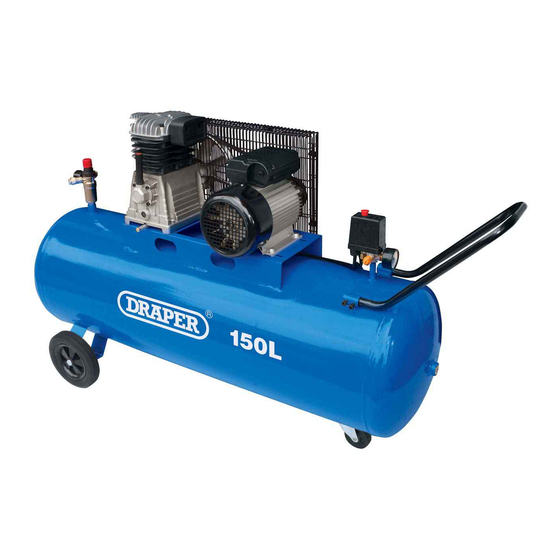Draper 400BLA Інструкція з експлуатації - Сторінка 8
Переглянути онлайн або завантажити pdf Інструкція з експлуатації для Повітряний компресор Draper 400BLA. Draper 400BLA 12 сторінок. 150 litre compressor

MAINTENANCE
IMPORTANT:
Before performing any maintenance operations,
disconnect the compressor from the power supply
and release all the air from the receiver until the
pressure gauge reads zero.
EVERY DAY:
A. Check the oil level and top up if required.
B. Drain the condensate from the receiver. The
drain plug (F) Fig.9 is situated on the under-
side of the receiver tank.
EVERY MONTH:
A. Clean the air suction filter using compressed
air. Replace the filter every 500 hours of use.
B. Check the tension of the drive belt and adjust
as necessary.
EVERY 500 HOURS:
A. Replace the oil. Remove the drain plug (G)
Fig.10 and drain the oil into a suitable
container. Refit the drain plug and refill the
crank case with new oil to the correct level.
B. Clean all the external surfaces of the pump
unit and motor. Ensure that neither the motor
fan cowling (H) or head cooling fins (I) are
blocked or obstructed in any way. See Fig.11.
EVERY 2000 HOURS:
Check the condition of the valves and replace
them if they are damaged or worn.
PRESSURE SWITCH SETTINGS:
The delivery pressure setting can drift over a
period of time and will require periodic adjust-
ment. Ensure that the pressure switch settings are
correctly adjusted and maintained at the correct
level. This will help prevent faulty occurring
which can result in reduced performance and
possible failure.
PRESSURE SWITCH ADJUSTMENTS:
To adjust the pressure level at which the cut-out
functions, remove the switch cover and turn the
pressure regulating screw clockwise to increase
the level and anticlockwise to decrease the level.
See Fig.12.
To adjust the cut-in pressure turn the cut-in pres-
sure regulating screw clockwise to increase and
anticlockwise to decrease the level.
WARNING:
DO NOT ADJUST THE CUT-OUT LEVEL ABOVE
THE MAXIMUM PRESSURE AS PER THE
MACHINE SPECIFICATION.
Fig.9.
(F)
Fig.11.
(I)
Fig.12.
- 8 -
(G)
Fig.10.
(H)
